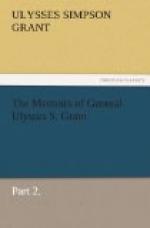During the eleven months that I lived in Galena prior to the first call for volunteers, I had been strictly attentive to my business, and had made but few acquaintances other than customers and people engaged in the same line with myself. When the election took place in November, 1860, I had not been a resident of Illinois long enough to gain citizenship and could not, therefore, vote. I was really glad of this at the time, for my pledges would have compelled me to vote for Stephen A. Douglas, who had no possible chance of election. The contest was really between Mr. Breckinridge and Mr. Lincoln; between minority rule and rule by the majority. I wanted, as between these candidates, to see Mr. Lincoln elected. Excitement ran high during the canvass, and torch-light processions enlivened the scene in the generally quiet streets of Galena many nights during the campaign. I did not parade with either party, but occasionally met with the “wide awakes” —Republicans—in their rooms, and superintended their drill. It was evident, from the time of the Chicago nomination to the close of the canvass, that the election of the Republican candidate would be the signal for some of the Southern States to secede. I still had hopes that the four years which had elapsed since the first nomination of a Presidential candidate by a party distinctly opposed to slavery extension, had given time for the extreme pro-slavery sentiment to cool down; for the Southerners to think well before they took the awful leap which they had so vehemently threatened. But I was mistaken.
The Republican candidate was elected, and solid substantial people of the North-west, and I presume the same order of people throughout the entire North, felt very serious, but determined, after this event. It was very much discussed whether the South would carry out its threat to secede and set up a separate government, the corner-stone of which should be, protection to the “Divine” institution of slavery. For there were people who believed in the “divinity” of human slavery, as there are now people who believe Mormonism and Polygamy to be ordained by the Most High. We forgive them for entertaining such notions, but forbid their practice. It was generally believed that there would be a flurry; that some of the extreme Southern States would go so far as to pass ordinances of secession. But the common impression was that this step was so plainly suicidal for the South, that the movement would not spread over much of the territory and would not last long.
Doubtless the founders of our government, the majority of them at least, regarded the confederation of the colonies as an experiment. Each colony considered itself a separate government; that the confederation was for mutual protection against a foreign foe, and the prevention of strife and war among themselves. If there had been a desire on the part of any single State to withdraw from the compact at any time while




